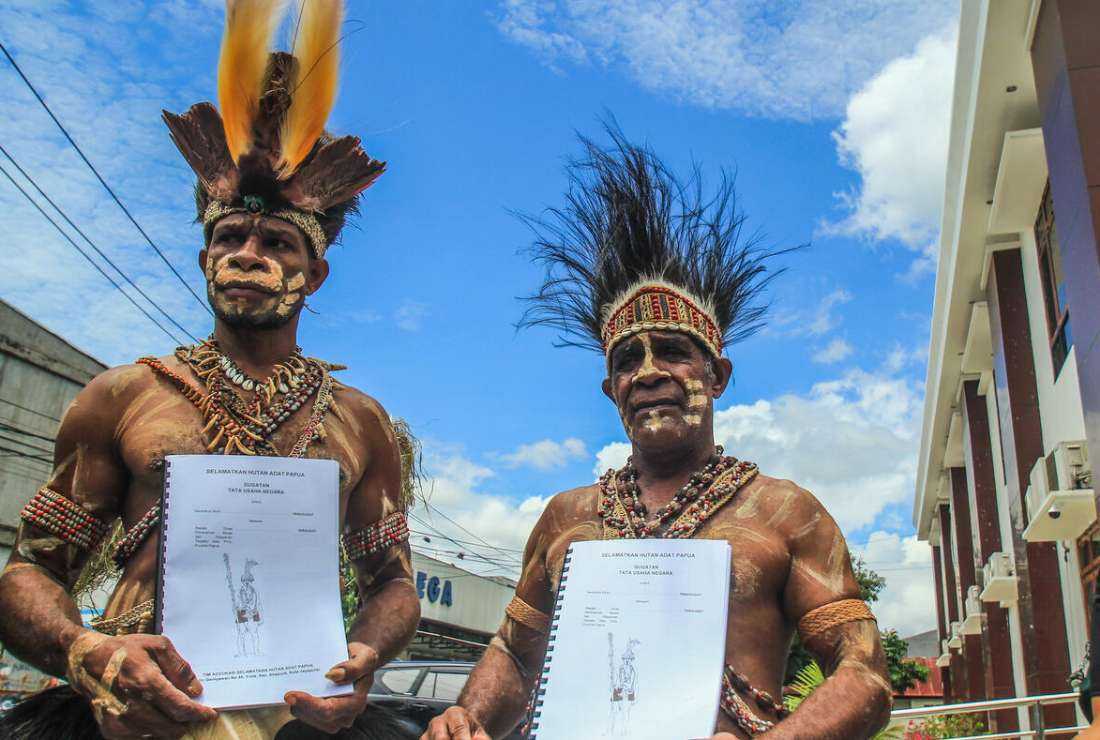
The plantation will take away the ancestral lands of some 20,000 people, 40 percent of them Catholics

Hendrikus Woro and Kasimilus Awe, representing the Awyu tribe, after filing the lawsuit against the government on March 13. (Photo: Greenpeace)
Indigenous people in Indonesia’s easternmost province have sued the government for issuing oil palm plantation permits by annexing their ancestral lands.
The Awyu tribal people, represented by Hendrikus Woro and Kasimilus Awe, filed the lawsuit in the Jayapura State Administrative Court in Papua province on March 13 over a permit given to PT Indo Asiana Lestari.
“We, as owners of customary territories, do not get information about the company's activities. We were also not involved in compiling the environmental impact analysis [report]," Woro, a leader of the Woro clan which forms part of the Awyu tribe, said.
The company, allegedly controlled by the Malaysia-based All Asian Agro, obtained the permit to plant oil palm on 39,190 hectares in 2017, according to a report by Greenpeace in 2021.
Woro said that Cinta Tanah Adat (Love Customary Land), a para-legal group in the Awyu tribe, sought explanations from a number of agencies in Papua province regarding the company, but no one responded.
The Awyu tribal people - with some 20,000 members - inhabit the watershed of the Boven Digoel River in Papua province with their main livelihood as foragers and hunters. Nearly 40 percent of them are Catholics, while the rest are Protestants.
Tigor Hutapea, a lawyer with Save Papua's Forests, an advocacy group, said the permit "ignored the existence of indigenous people as owners of ancestral lands, and was flawed in substance because it was not accompanied by a conservation analysis [report]."
"This could result in environmental damage and loss of indigenous people's rights," he said.
In a statement, Greenpeace said that the permit given to PT Indo Asiana Lestari was not in line with the government's promise to address climate change, namely reducing greenhouse gas emissions by 31.89 percent with international support by 2030.
“The company’s environmental permit is expected to trigger deforestation in an area where the majority of primary dry forest land is 26,326 hectares. The potential for released carbon emissions if deforestation occurs is at least 23 million tonnes of CO2. This will contribute 5 percent of carbon emission levels by 2030,” said Sekar Banjaran Aji of Greenpeace.
Emanuel Gobay, a Catholic lawyer, said it is a common practice in Papua, where the government grants permissions for plantations and logging, ignoring the rights of indigenous people.
“This should be stopped. It will only further marginalize indigenous Papuans. Papua's forest is also the largest remaining rainforest in Indonesia," he said.
Father Cornelius Manu from the Merauke Archdiocese's Justice and Peace Commission, said they fully support the tribal people’s legal efforts to save their lands.
The tribal people are often “powerless in the face of the expansion of investors, supported by the government. It should be criticized," the priest told UCA News.
According to Greenpeace, around 168,471 hectares of primary forest in Papua were converted for palm plantations between 2010 and 2019, and plantation is expected to increase.
Help us keep UCA News independent
The Church in Asia needs objective and independent journalism to speak the truth about the Church and the state.
With a network of professionally qualified journalists and editors across Asia, UCA News is just about meeting that need. But professionalism does not come cheap. We depend on you, our readers, to help maintain our independence and seek that truth.
A small donation of US$2 a month would make a big difference in our quest to achieve our goal.

Share your comments